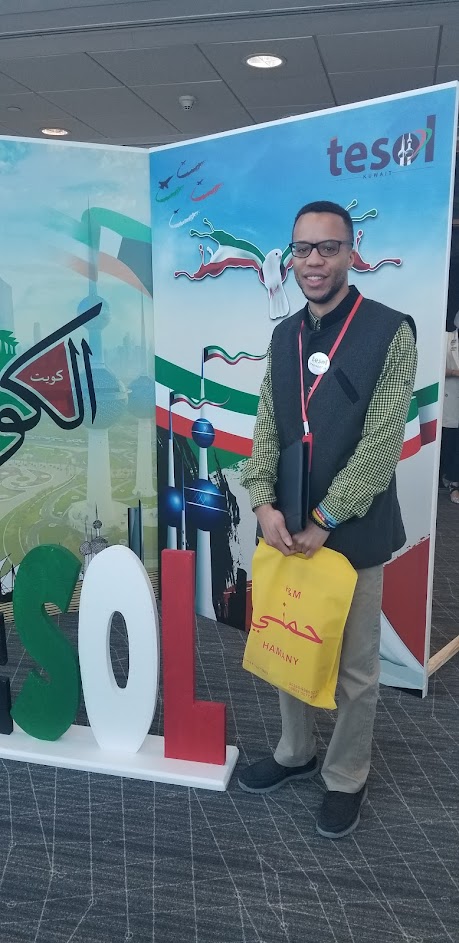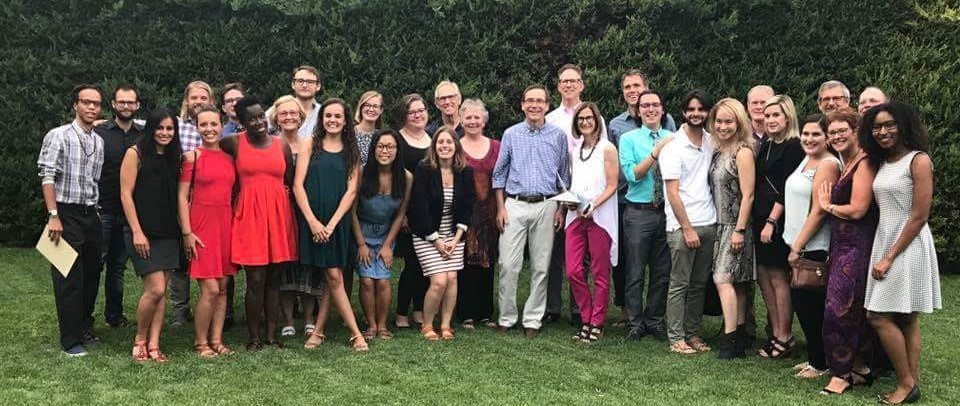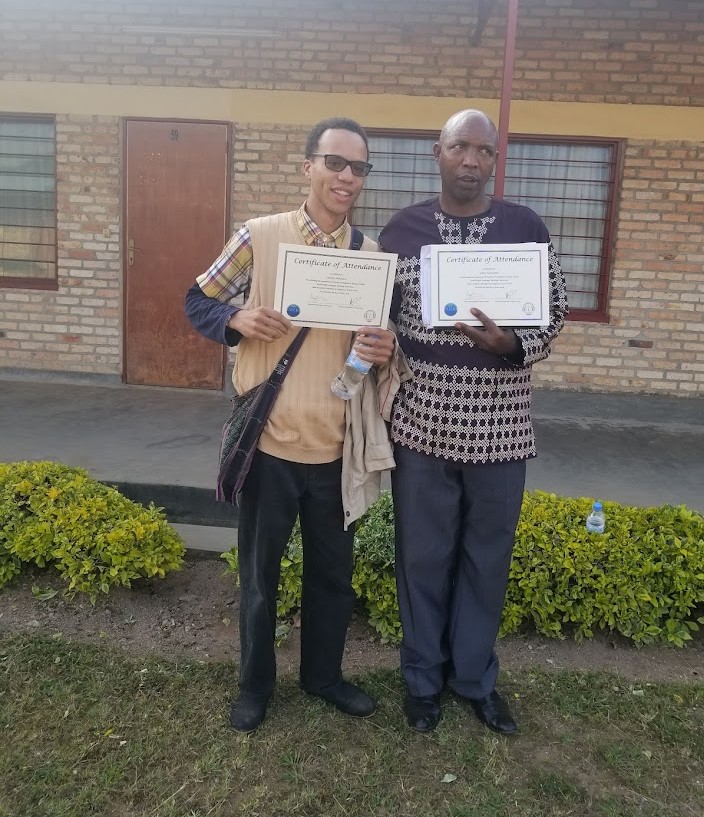Travels of a globe-trotting English teacher
How Charles McKinney took his TESOL degree on the road
June 14th, 2022 | Careers, SIT Graduate Institute
- Find out more about SIT's part-time hybrid MA in TESOL program

English has become Charles McKinney’s round-the-world ticket. A recipient of a National Peace Corps Association scholarship, Charles is finishing up his MA in TESOL at SIT Graduate Institute this month, but the 34-year-old has been teaching and traveling since he graduated 13 years ago from Immaculata University in Greater Philadelphia, his hometown.
“It’s funny how life unfolds,” says Charles via a Zoom call from Baghdad, where he teaches English. “I never planned on becoming a teacher, let alone traveling around the world. I was hoping to go to business school to pursue an MBA after college and work in the corporate world at an international level. But I gravitated more toward the cultural as opposed to business aspects.”
While substitute teaching after college, Charles got an email inviting him to apply to teach English in South Korea. In September 2010, he was on his way to a vocational high school in Andong with the English Program in Korea (EPIK). “That ignited the whole fascinating world of teaching and traveling in different countries,” he says. “I found my element.”

Over the next dozen years, Charles taught in China and Thailand, with the Peace Corps in Macedonia and Rwanda, and independently in Saudi Arabia, Kuwait, and now Iraq. He studied Korean and Kinyarwanda and learned to speak, Mandarin, Macedonian, and colloquial Arabic.
We talked with Charles on May 5 (the date is important, as you’ll read below) about his experiences as a world-traveling English teacher.
What are you doing in Iraq?
I’m at the American University of Iraq, which officially opened last February. It’s meant to be a top-tier research institution that partners with schools in the United States and elsewhere. I’ve never been a part of a start-up before, so to be a pioneering faculty member has been an amazing experience.
Tell us more about your experiences since college.
I was in Korea for a year teaching at a vocational high school. Korea is a great launching pad for a TESOL career. You only really need a college degree; you don’t need a lot of experience. There’s a high demand for foreign instructors from all over the world, and you get a lot of support from your Korean co-teachers. It helps with that transition, especially if it’s your first time abroad.
Korea is a great launching pad for a TESOL career.
Korea is where I earned my TESOL certificate online to prepare me for my next job, which was at a private language school in Beijing, China. That was a completely different experience. I had never lived in a megacity before, and it was a huge transition. I had studied Mandarin in college, so I had a working knowledge of the language, and I did some self-study before I went to help me refresh my memory. When I got there, it all came back; my Chinese colleagues were speaking it; I had a Chinese roommate and a Chinese tutor who helped me prepare for the Chinese language proficiency exam.
Why did you take the proficiency exam?
I took it for personal enrichment. I wanted to know what language gains I had made. I would love to go back someday to work on it even more.
Then came Thailand. I went there to study abroad for my first master’s, in media communications at Webster University’s (which is based in St. Louis) Thailand campus. It’s an accelerated, full-time MA program. I taught part-time that year to help with expenses.
Something that resonated with me was the fact that SIT had a history with the Peace Corps.
I traveled to St. Louis to graduate in 2014, and I didn’t really know what to do next. I wanted to stay in Thailand in my field, but nothing presented itself. I had applied to the Peace Corps before I left, and I finally heard back while I was home, so on Dec 31, 2014, I got my offer for Peace Corps in Macedonia. It was a phenomenal way to end a year and begin a new year. I started Peace Corps in September 2015, teaching English at a village primary school. I had to learn the language, which is like Serbian, Bulgarian and the other Slavic languages of the Cyrillic alphabet.
Does language learning come easily for you?
I seem to have the capacity to learn languages. It’s like a knack. I find in my teaching that some students pick it up easier while others struggle more. I wish I had started learning a second language in childhood; I didn’t start until high school (having studied Spanish and Italian). Second-language acquisition happens more quickly for children. I wish that my schools offered that when I was growing up.

Like Thailand, I wanted to stay in Macedonia. I had invested so much time in learning the language and had reached an advanced level. I had friends there, and I didn’t want to leave, but it wasn’t meant to be. I applied to Peace Corps Response, a short-term, high-impact version of Peace Corps service for more experienced professionals and/or those who are Returned Peace Corps Volunteers. This position was for a TEFL lecturer at the University of Rwanda. I stayed there for six months, and then I was ready to re-enter the workforce. So, I went to Saudi Arabia to teach foundation-year English for pre-university students in Riyadh.
What brought you to SIT’s MATESOL program?
In Rwanda, I met an SIT alum, a fellow Peace Corps volunteer who was a teacher trainer at the same university. She told me about SIT and said it had a great MAT program. I had been thinking about another MA, and something that resonated with me was the fact that SIT had a history with the Peace Corps, so I went for it. I was accepted in January 2019 and started in June. I completed the program as of today.

Today! Congratulations! How has the SIT experience been for you?
Being able to work full-time and study in this hybrid format was beneficial to me. I didn’t want to do another full-time program because I wanted to be able to continue working and pay for my education. That first summer, 2019, I got to come to Vermont with my cohort. It was special to form those connections pre-Covid. It was new for me, being in such an intimate and communal space where presence and active listening are important. I learned a lot about cultural and emotional intelligence.
[In an essay in Inside & Between, a book published this year by SIT MA TESOL faculty, Charles writes about the importance of active listening: “When I arrived at the SIT campus for the first summer residency, my exposure to and experience with active listening deepened in a way that I never encountered in academia. … It was a profound and intensive intellectual encounter that seemed strange to me because it countered everything I was used to seeing, knowing, and doing in my former academic experiences.”]
It was a profound and intensive intellectual encounter that seemed strange to me because it countered everything I was used to seeing, knowing, and doing in my former academic experiences.
From an essay by Charles McKinney in Inside & Between
I decided to do my SIT specialty in teacher training and development. At this point in my career, I feel I have something to offer, some life experience and wisdom to pay it forward and encourage the next generation of educators to join this amazing profession, which is so cool and adventurous.
You seem to have a real appetite for learning. Why did you decide to apply for a Critical Language Scholarship (CLS)?
That’s thanks to Elka [SIT TESOL Professor Elka Todeva]. What I love about SIT is how the professors share resources and programs to apply to. In October, Elka sent us information about CLS. She provided a letter of recommendation for me. I applied and … in March, was named a finalist for the Arabic virtual study abroad program.
Where do you see yourself going with that?
Perhaps joining the Foreign Service and working as a regional English language officer. That really appeals to me. And they get to move around as well. That would be a dream job. I would also love to work with Arabic-speaking refugees at some point.
That does seem important for you!
Mobility? Exactly! I have the travel bug. Wanderlust. I love how SIT is so global in its influence and impact that SIT alumni are everywhere. I love being affiliated with an international organization.
Is there anything else you would like to add?
Fortunately, throughout my travels I have found Christian communities of faith where I can worship and make new friends. I would be remiss not to mention the strong impact Christianity has made on my life. And I’ve learned a lot about other religions and faith traditions. I do believe in interfaith harmony and peacebuilding. I respect other people’s beliefs and faith, and I learn from them, as well.
Read Charles' MA thesis, "Virtual Free-Writing Journal Portfolios in an Intensive English Program" in the SIT Digital Collection.
